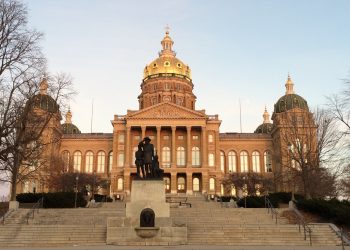DES MOINES, Iowa – An Iowa Senate subcommittee on Thursday recommended the passage of SSB 1004. If passed, the bill would reinstate capital punishment as a sentencing option in Iowa in the instance of an adult offender found guilty of the multiple offenses of first-degree murder, kidnapping, and sexual abuse of a minor.
The panel was made up of State Senators Julian Garrett, R-Indianola, Jason Schultz, R-Schleswig, and Tony Bisignano, D-Des Moines. Garrett and Schultz recommended passage while Bisignano opposed it.
The last execution in Iowa was on March 15, 1963, when a federal inmate, Victor Harry Feguer, was hanged at the Iowa State Penitentiary in Fort Madison for the kidnapping and murder of a physician in Dubuque. According to the Death Penalty Information Center, when Iowa had the death penalty, 46 executions were carried out between 1834 to 1965 when it was abolished.
The subcommittee heard from several Iowans, lobbyists who represented organizations, and ordinary citizens who wanted to express their point of view.
Most of those who spoke opposed the bill.
Connie Ryan, with the Interfaith Alliance of Iowa Action Fund, pointed out racial disparities in applying the death penalty.
“The data and facts are clear the implementation of the death penalty is influenced by the racial undertones of our nation’s history. African American men are adversely and disproportionately impacted. They are more likely to be given the death penalty upon conviction, especially if a victim is white. This alone is argument enough against the death penalty, but we have additional concerns, concerns such as innocent people being sentenced to death,” she said.
Tom Chapman, executive director of the Iowa Catholic Conference, provided a Catholic perspective.
“We certainly agree it’s a duty of the state to punish offenders and defend the common good, but we don’t believe it’s necessary to take further life to accomplish that goal. We know there’s a special need to offer sympathy and support for the victims of violent crime in their families. And we do that through our churches. But from our religious perspective, every person is created in the image and likeness of God. Even those who have committed great harm retain their human dignity and their capacity to reform, to love, and to be loved. So we believe that state-sanctioned killing in this case does not deter or end violence, but instead perhaps perpetuates a cycle of violence,” he said.
Nathan Blake spoke in opposition to the bill on behalf of Attorney General Tom Miller.
“One of the things that you’ve heard already, but it is essential as we consider our justice system and its purpose is that the death penalty is not a deterrent to crime. It’s been proven that way in many, many studies. The death penalty is a huge burden on the judicial system. It’s a burden on the prosecutors and appellate attorneys who have to deal with it. It’s an additional burden on the judicial system itself. And those resources can be better spent elsewhere,” he said.
Rev. Brian Carter, a pastor who serves on the Iowa Conference of the United Methodist Church’s advocacy team, shared about a family who attended Trinity United Methodist Church in Des Moines, where he served as pastor. The family’s daughter was murdered.
The offender was sentenced to life in prison and died of natural causes.
“This is a better outcome than seeing him put to death. It gave the family time and opportunity to heal and to forgive. They felt more at peace with it. The offender had time to consider what he had done,” Carter said.
Only one person who provided feedback to the subcommittee supported the reinstatement of the death penalty.
Pastor Sam Jones with Faith Baptist Church in Hudson spoke in favor of the bill.
“We think of the history of our jurisprudence and our law comes from mostly from Blackstonian legal theory. And Blackstone pointed out that no human law should be obeyed if it contradicts Divine Law or revealed law. He stated very clearly that divine law and revealed law are found in Scripture,” he said.
“Well, Genesis 9:6 which is where we’d often find the founding of our civil government says, this, ‘whoever sheds man’s blood by man, his blood shall be shed for the image of God he made man,'” he said.
“And we’re not talking about, of course, putting to death those who are innocent; we’re talking about those who are guilty and who have destroyed that image of God and done incredibly heinous crimes, specifically to minors,” Jones argued.
Citing Romans 13, he added, “It tells us that we can be unafraid of our government because they bear the sword, not in vain, but they do it so righteously, this would be a righteous sense to do this, to execute capital punishment upon those who are in fact guilty of a capital crime. And that is the actual responsibility of our civil government.”
As the public hearing closed, Garrett explained his support of the bill.
He emphasized that the bill allows for the application of the death penalty in limited circumstances. Garrett also said that the legislation offers numerous safeguards regarding legal representation and determining the offender’s mental health.
He pointed out that while several members of the public pointed out studies that demonstrate the death penalty doesn’t deter crime, Garrett claims some studies say it does.
“I am an advocate of the death penalty in appropriate situations. And I believe that this would be a very appropriate situation,” Schultz said, offering his support for the bill.
He also noted this is an issue that has been discussed during several legislative sessions.
Bisignano noted that Gov. Kim Reynolds, during her Condition of the State Address, discussed criminal justice reform.
“All Iowans were happy to hear that in light of what we went through this past year, and then in June when we came back to address some immediate issues. But the long term need for criminal justice reform in Iowa, that’s what I think the governor signaled, and I never yet in my time 17 sessions saw a death penalty push so hard by a general assembly that isn’t proposed by the governor,” he said.
Bisignano noted he also didn’t understand the timing, why the bill came out the first week of the session. “I don’t see the urgency. I don’t, I don’t see it,” he said.
He also said someone could come into a school and murder many children but not get the death penalty because sexual abuse was not involved.
The full Senate Judiciary Committee will now consider the bill.
Listen to the public hearing on the bill below:
Read the bill below:
SSB1004















